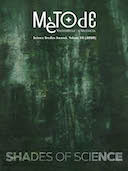Editorial
DOI:
https://doi.org/10.7203/metode.10.16462 Abstract
Abstract
Science continues to face new challenges every day. Climate change, ensuring sustainable agriculture, opening up new ethical debates about genetic practices, the use of new digital spaces and information, etc. The first thematic monograph in this new volume of Mètode Science Studies Journal tackles our society’s most urgent challenges in building a sustainable future.
And yet another challenge is the focus of another one of the monographs contained in this volume: understanding the complexity of our planet’s current biodiversity. Evolution is key to solve this question. These pages present us with different scenarios that help us to better understand how to tackle the new challenges faced by our planet’s species.
However, addressing scientific challenges is not only about hoping for a bright future, but also about looking back and learning from our mistakes. Science has much to say about our memory; it can help us to better understand how we got here, and to successfully close episodes of our history. Learning about how the Commonwealth recovers and identifies the remains of fallen WWI soldiers might help us understand the outstanding debt that we owe to our own historical memory. Through the different articles in this monograph, we discuss how much forensic science can tell us about our history, from Roman times to the Spanish Civil War.
After all, our past can reveal a great deal about our present and help us to understand exactly what challenges we face as scientists and as a society. That is why the issue devoted to the relationship established between scientists and the Nazi regime in the first half of the twentieth century is especially significant. What did the purges carried out by the Nazis mean for science? To what extent did the scientific community look the other way? Did they even take advantage of the situation? What was the relationship between Nazi ideals and some scientific postulates?
The historian Christian Ingrao reminds us in his opening article that the vast majority of university professors (99% of them) continued working in Nazified institutions. If we are to solve current and potential challenges hoping for a better future, we must take a look at the past and learn both from the lighter and the darker shades of science.
 Downloads
Downloads
Downloads
Published
How to Cite
-
Abstract367
-
PDF169
Issue
Section
License
![]()
All the documents in the OJS platform are open access and property of their respective authors.
Authors publishing in the journal agree to the following terms:
- Authors keep the rights and guarantee Metode Science Studies Journal the right to be the first publication of the document, licensed under a Creative Commons Attribution-NonCommercial-NoDerivatives 4.0 International License that allows others to share the work with an acknowledgement of authorship and publication in the journal.
- Authors are allowed and encouraged to spread their work through electronic means using personal or institutional websites (institutional open archives, personal websites or professional and academic networks profiles) once the text has been published.





